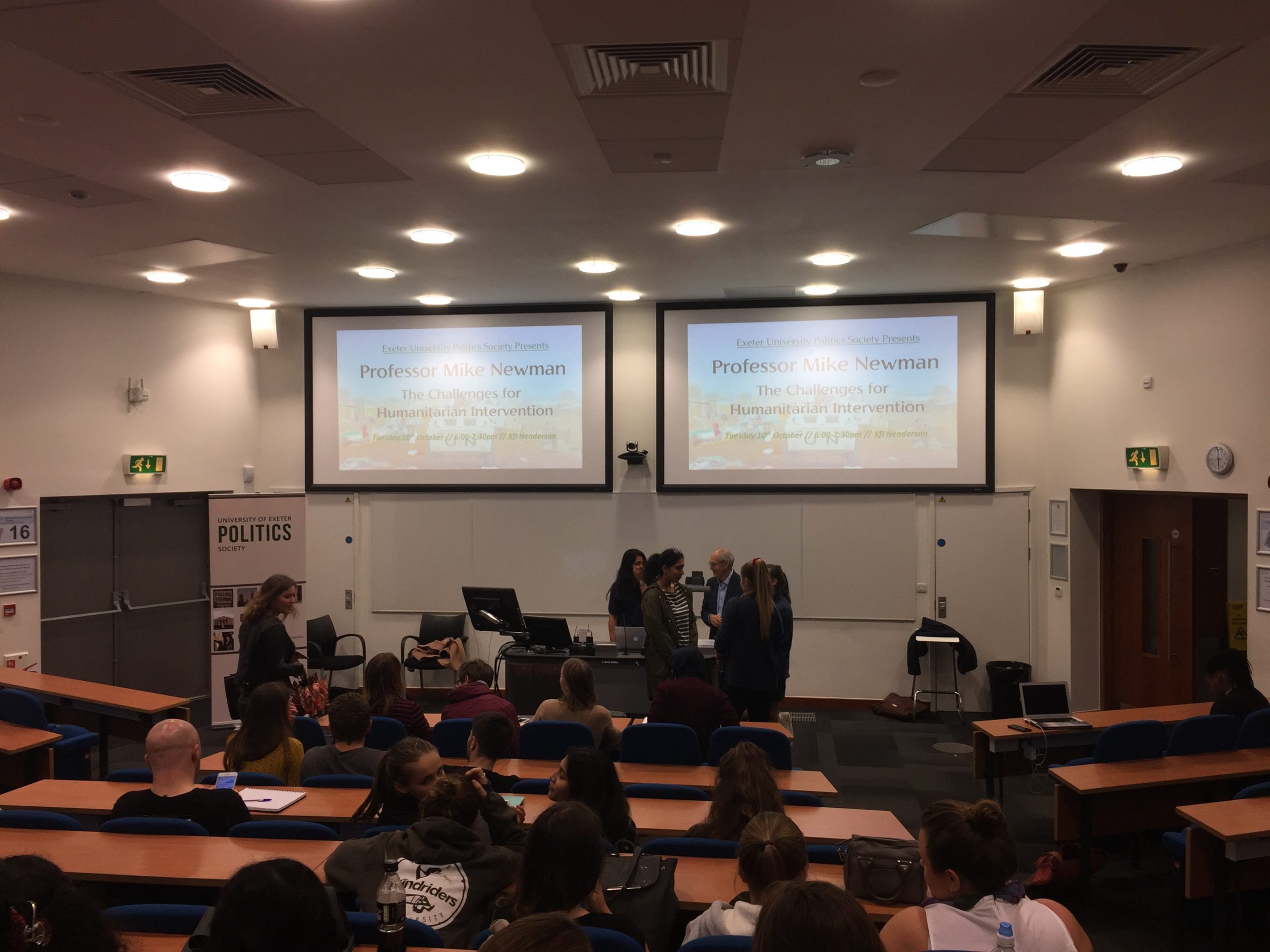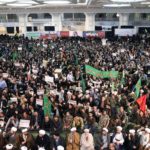
Human rights is, and always has been, a contested area. During the Cold War, human rights in relation to anything international raised one critical question – what was the relationship between human rights and state sovereignty? State sovereignty was fundamentally the building block of international relations, international law and the United Nations (UN) system.
Whilst the UN gave expression to human rights (for example, in its universal declaration), state sovereignty was far more concrete, tangible, and enforceable in the security council. The primary focus revolved around the question of non-intervention. For all intents and purposes, non-intervention and state sovereignty were key.
For all intents and purposes, non-intervention and state sovereignty were key.
These questions were being discussed in political thought, with some lawyers talking about partially eroding the notion of state sovereignty. The big question here was why should state sovereignty be so fundamental? Why should it triumph human rights if it was a question of mass atrocities or massacres? Why should it be so important to maintain state sovereignty?
On the other hand, there was the strong possibility and fear that powerful states in the West would use any reduction of state sovereignty to push for forms of intervention that were in their interests.
What happened between 1991-2003 was a massive shift in the practice of ‘humanitarian intervention’. Whilst the term wasn’t new, the way it came about was on a completely different scale. There were four key episodes in that period that underlined this shift:
1) Bosnia:
Including the disintegration of Yugoslavia, war crimes, atrocities and ethnic cleansing. This warranted humanitarian intervention.
2) Rwanda:
There were far greater atrocities but no (effective) intervention. What was troubling was the question that if there was a case for humanitarian intervention in Bosnia, why not in Rwanda? Were the lives of Europeans were valued more than those of Africans? The policy of the West was to get the then leader to accept IMF neo-liberal policies, whilst failing to acknowledge how the ethnic divides which were fuelling the conflict had been reinforced by colonialism.
3) Kosovo:
Massacres and killings on far smaller scale than Bosnia or Rwanda. The intervention was unilateral and carried out in a way that meant no risk for the interveners but lots of risk for the population (high level bombing). This led to the dismantling of a state – the aim was to prevent atrocities, but the impact was changing state boundaries.
4) Iraq war:
Blair claimed it was a case of humanitarian intervention. There were debates about whether it was to do with oil or preventing a state that was challenging the US. Mike Newman was and is sure it had absolutely nothing to do with humanitarian concerns.
Mike Newman rejected certain ways of approaching humanitarian intervention:
1) Pacifist / non-violence:
We can’t say there could never be a case in which force should be used. If you say this, there’s never a case for humanitarian intervention (humanitarian intervention is a form of military intervention).
2) If there are atrocities on a big enough scale, there always should be intervention:
This is an impossible stance to take – suppose the Russians in Chechnya were carrying out atrocities as least as bad as in Kosovo: how could there be a case for humanitarian intervention if the consequence would be world war? You can’t make the case irrespective of probabilities or calculations. Suffering of a world war would be greater than what the Chechens were facing. There needs to be consideration of consequences.
3) If you intervene somewhere, but you don’t intervene in other cases, then you’re just being selective and inconsistent:
The consequences are important in trying to establish some kind of criteria.
4) Never intervene because any kind of intervention in any circumstances breaches the state sovereignty and non-interference rule:
There are circumstances in which an intervention is justified. There needs to be some criteria and bearing on consequences.
In the 1990s interventions were too open-ended and it was easy for strong powers to make a case for humanitarian intervention which didn’t necessarily have anything to do with it because there was no principle on which it could be judged. The only principle to oppose it by would be complete non-intervention. Alternatively, with each intervention states upheld the non-intervention rule but claimed there were certain exceptions to it.
There was some progress when the International Committee on Intervention and State Sovereignty came up with the Responsibility to Protect (R2P) in 2001 which defined the crimes that warranted intervention (ethnic cleansing, genocide, war crimes, and crimes against humanity).
The way in which rich states defined humanitarianism was very limited, quite hypocritical and inadequate in various ways. In particular, humanitarianism wanted to cut out anything that was political in relation to causality. There could be humanitarian assistance to eliminate poverty and bring about better medical care but there was very little acknowledgement or acceptance of the fact that the West has a responsibility for creating the conditions that led to humanitarian suffering. This is related to some of the violence and atrocities that have occurred in many countries. You can see in a lot of the humanitarian intervention crises things that the West have done were in the very least partly responsible for the atrocities that occurred.
The way in which rich states defined humanitarianism was very limited, quite hypocritical and inadequate in various ways.
The UN is a very complex organisation and is often scapegoated by governments for R2P failings. However, it is too easy to say that the UN is the problem: for all its flaws (of which there are vast numbers), the idea of an institution of which all countries are members is important.
Humanitarian intervention needs to have some kind of understanding and commitment to change. When R2P was initially being devised there were some glimmers that made it seem as if it was going to look at factors of the international political economy and harmful economic impacts on many developing countries. When it came to the bargaining, that part mainly went. This meant that the final version of R2P was less radical and helpful than some of the earlier doctrine had shown promise to be.
Aside from humanitarian intervention being just military intervention, R2P focused on non-military aspects, including the need for prevention and to stop these situations happening by non-military means, and responsibilities at all levels including on states themselves.
Peacebuilding always has to be a situation where the role of the external force is to facilitate and help internal forces. External forces cannot impose peace, and there is extraordinary irresponsibility when forces withdraw from a country which has no existing institutions or infrastructure and long-term divisions remain. This was the case in Libya.
While there are lessons that can be learnt from one place to another, it’s also true that every place is different. What needs to be addressed is the specificity of each case and the dynamics – it isn’t feasible to just follow external blueprints.
At the time at which Mike Newman finished his book in 2008, he had doubts: Russian-US relations were worsening, Chinese-US relations were worsening, states were pursuing their interests in the same way and there was no major shift in the international political economy.
On the other hand, there were some reasons to be optimistic: the removal of Blair and Bush made a difference; normative changes were happening; the 2007-8 intervention in Kenya was a non-violent external intervention, with support for the government and bringing people together.
However, there have been some massive setbacks:
1) Libya 2011:
West manipulated the Libyan resolution to turn it into something it hadn’t been and into a case of forcible military regime change carried out in an appalling way. There was no notice taken of responsibility to rebuild at all. The removal of the dictator isn’t always the issue and forcible regime change wasn’t the way to do it
2) R2P could be manipulated in ways that had happened before with humanitarian intervention:
This helped Russia to be able to rationalise some of its own interventions
3) Syria:
Humanitarian disaster in all sorts of respects and an occasion for all kinds of actors (regional and international) to fight different kinds of proxy wars without any coordinated attempt at any point to carry out any R2P principle
4) Yemen:
War crimes, crimes against humanity, mass atrocity crimes – real politik has led the Saudi coalition to perpetrate much of this
5) Myanmar:
Classic case of ethnic cleansing; in terms of preventive, early warning, very little was done
6) Latest report by UN Secretary General in August 2017 :
“There remains too much of a gap between the commitments and legal obligations of member states & actual lived experience of vulnerable populations; our failure to deliver on what we promised by protecting populations from atrocity crimes shames us all’.
Mike Newman said his mood is now much gloomier than it was in 2008. He sees politics as absolutely fundamental in changing the way we approach humanitarian intervention.
Current political leaders of Russia, US, China and the repressive regimes they support demonstrates that there is absolutely no belief in the importance of any kind of principles or attempt to create new norms or what kinds of possibilities there can be to address mass atrocity crimes. Although Mike personally thinks mass atrocity crimes always have causation and we need to address causation, it seems important to try to establish international institutions and principles that locate an international responsibility of states to protect populations. It is very hard to be optimistic in the short term when the major powers in the world have absolutely no interest in propelling any of those norms forward.
In terms of looking forwards, Mike Newman identified a definite need to address the nature of the UN and the pivotal role of the Security Council. There is a need for an extension of the idea of economic and social justice notions in R2P to look at the fundamental causes of what’s happening, rather than just the crimes themselves. However, the counter-arguments highlights the risk that expanding R2P away from specific crimes makes it too diluted. Above all, it’s the interests of the richer countries which are keeping R2P the way it is. There is a need to look closely at how R2P is implemented, under what circumstances, and what notice is taken of the annual reports of it. Lots of countries in the global South were worried that R2P was another name for humanitarian intervention and therefore a pretext for military intervention, which was reinforced by the Libyan intervention. The international political economy still upholds privatisation and free trade which don’t necessarily act in the interests of lots of parts of the world.
There is a need for an extension of the idea of economic and social justice notions in R2P
Brazil reformulated R2P as Responsibility While Protecting (RwP) which made the different pillars of R2P act sequentially, eroding the possibility of a situation in which you could have military intervention without having gone through the other stages.
At this stage, Mike Newman believes a completely new concept wouldn’t be helpful, but there is scope to do things with the existing one.



Average Rating